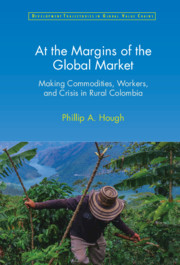Book contents
- At the Margins of the Global Market
- Development Trajectories in Global Value Chains
- At the Margins of the Global Market
- Copyright page
- Contents
- Figures and Tables
- Acknowledgments
- Introduction
- 1 Toward a Sociology of Labor and Development at the Margins of the Market
- Case Study #1 The Rise and Fall of Hegemony in the Coffee Regime of Viejo Caldas
- Case Study #2 Despotism and Crisis in the Banana Regime of Urabá
- 4 The World Historical Origins of Despotism in Urabá
- 5 Despotism, Crisis, and the Social Contradictions of Peripheral Proletarianization in Urabá
- Case Study #3 The Rise and Fall of FARC Counter-Hegemony in the Coca Regime of Caquetá
- Conclusion
- Appendix
- References
- Index
4 - The World Historical Origins of Despotism in Urabá
from Case Study #2 - Despotism and Crisis in the Banana Regime of Urabá
Published online by Cambridge University Press: 07 January 2022
- At the Margins of the Global Market
- Development Trajectories in Global Value Chains
- At the Margins of the Global Market
- Copyright page
- Contents
- Figures and Tables
- Acknowledgments
- Introduction
- 1 Toward a Sociology of Labor and Development at the Margins of the Market
- Case Study #1 The Rise and Fall of Hegemony in the Coffee Regime of Viejo Caldas
- Case Study #2 Despotism and Crisis in the Banana Regime of Urabá
- 4 The World Historical Origins of Despotism in Urabá
- 5 Despotism, Crisis, and the Social Contradictions of Peripheral Proletarianization in Urabá
- Case Study #3 The Rise and Fall of FARC Counter-Hegemony in the Coca Regime of Caquetá
- Conclusion
- Appendix
- References
- Index
Summary
This chapter begins by comparing the developmental ecologies of bananas and coffee, showing how banana production for export has tended to arise on capital-intensive and fully proletarianized plantations dominated by vertically integrated transnational fruit companies. The spread of proletarianized and peripheralized banana regimes in the early part of the twentieth century generated local labor unrest throughout the banana-producing regions of Latin America, but this unrest was largely quelled by partnerships between authoritarian governments and the banana companies. This partnership unraveled as British world hegemony collapsed in the 1930s and 1940s. However, the world banana market was reconstructed under US world hegemony through a process of vertical disintegration that transformed banana transnationals into buyers/distributors and created spaces for the formation of local banana exporters through domestic development initiatives. In Colombia, this process transformed Urabá’s banana zone into a key site of development, but it only permitted entrance into a peripheral niche of the market. Collective action strategies akin to the ICA for coffee failed to generate opportunities for upgrading, pressuring Colombia’s banana planter-exporters to become heavily reliant upon the authoritarian practices of the National Front regime to quell worker unrest and maintain labor control on Urabá’s banana plantations.
Keywords
- Type
- Chapter
- Information
- At the Margins of the Global MarketMaking Commodities, Workers, and Crisis in Rural Colombia, pp. 131 - 178Publisher: Cambridge University PressPrint publication year: 2022

